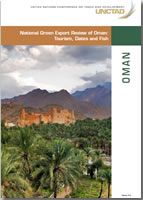
Economic diversification and sustainable growth are among the key priorities of Oman's national development strategy. Diversification efforts lead to a progressive growth of non-crude oil exports which raised from 8 per cent to 38 per cent of the total merchandise export from the Sultanate from 1990 to 2016.
Oman's Ninth Five-Year Development Plan, which sets out Oman's economic development priorities between 2016 and 2020 identifies manufacturing, tourism and fisheries as priority sectors to promote economic diversification.
The plan also highlights the necessity of increasing the share of non-oil exports as well as the importance of attracting foreign direct investment.
The Oman National Green Export Review
The Oman National Green Export Review (NGER) was initiated in 2015 by Oman's Ministry of Commerce and UNCTAD with the aim of supporting the emergence of green production and export sectors, in line with the Sultanate's sustainable development framework.
An initial analysis of Oman's trade data conducted by UNCTAD using the Green Product Space methodology was used to identify highly competitive green products for which Oman has a revealed comparative advantage in production and export. As a result, tourism, fisheries and date palm products were identified as promising green sectors with strong potential in terms of employment creation and sustainable use of environmental resources.
As a result of the Oman NGER, An action plan was prepared by a multidisciplinary team of national experts for further consideration by the Omani government. It aims to foster linkages between tourism, fish and palm date sectors, using tourism as a transversal activity to promote green export.
The plan revolves around three strategic areas:
-
Promoting agritourism through the identification of pilot sites, the organization of farm visits, the development of cultural activities in relation with farming communities (including sales and demonstrations centered around traditional handicraft).
-
Integrating tourism activities in fishermen's villages via the development of sea trip on traditional boats, whale and dolphin watching and visits to fish markets.
-
Developing cross sectoral linkages and cooperation by establishing a multisectoral, public private collaboration platform and providing technical assistance to farmers and fishermen to supply local hotels and develop touristic activities.
A detailed version of the above action plan along with an analysis of the linkages between tourism,fisheries and palm date sectors are presented in this publication.




